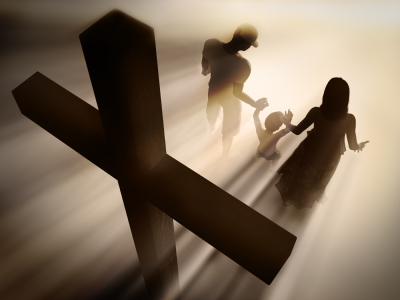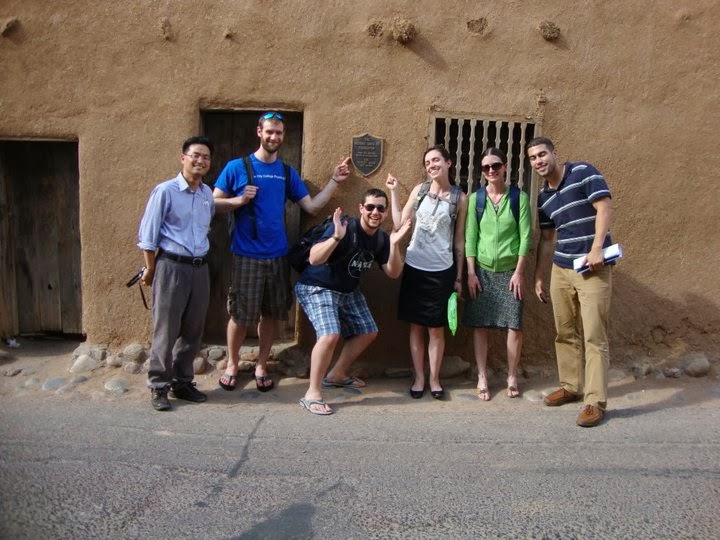The secular media have been SO excited about Pope Francis on the social justice front and so many people admire how this Pope puts his faith into action in such a visible way. I love it too. However, many of the articles I've read suggest that Pope Francis is far less concerned about sin than previous Popes. "Finally!" they exclaim. "We have a Pope who realizes that suffering is the greatest evil." Why spend so much time talking about sin when people in the world are suffering?? Pope Francis himself described the Church as "a field hospital after battle."
There is a misunderstanding here. Catholics know that Sin is the cause of all human suffering. As Pope, Francis certainly knows this. It is impossible to eliminate suffering without eliminating Sin. And if we don't strive to avoid sin we will have an eternity of suffering. The Pope is not one of those fluffy theologians who believe that everyone is going to Heaven. He can admit that even some atheists probably go to Heaven. (I know plenty that I'm rooting for!) However, he notably did not say that all atheists go to Heaven. He talks about the Devil. A lot. He believes in the threat of eternal damnation. And so the most important thing that the Hospital Church is doing is saving people from spiritual death.
As Jesus said:
"Do not be afraid of those who kill the body but cannot kill the soul; rather, be afraid of the one who can destroy both soul and body in Gehenna."
In fact, anything is better than Hell (even a life without sex!).:
"If your right eye causes you to sin, tear it out and throw it away. It is better for you to lose one of your members than to have your whole body thrown into Gehenna."
Dang… that Jesus was a little too dramatic if everyone is going to Heaven no matter what they do (especially the people who try to be nice all the time).
**********************************************************************************************
An Aside: People joke that Hell is more fun than Heaven because Sin is not allowed in Heaven. But what is the reason for thinking that Hell is filled with worldly delights?? Come on, people. When you are in Hell, if that's where you've decided you're going, you will not be participating in orgies. You will be wailing and gnashing your teeth. You will be tortured. Forever. How is that more fun than anything? Especially more fun that an eternity of not being tortured.
**********************************************************************************************
The media seem to miss the obvious analogy. When Pope Francis says that the Church is a field hospital after battle he does not mean that the Church is literally a field hospital in the battlefield of life. He means that the Church is a field hospital for the spiritual battle. Some people will say, "DUH!" But the secular world easily, and understandably, misses the point.
The Church should provide spiritual services, including all of our worldly services, in the same way that medical services must be provided on the battlefield. Because the situation is dire. We do not know when we will die. And the most important thing is to save the soul. Then we help a person grow in holiness. If you come across a woman who is dying on the street after being hit by a car you very simply encourage her to repent and believe in the gospel. If she somehow miraculously lives through the accident, then you start talking about why she shouldn't be using birth control pills. That's why Francis describes the Church as a field hospital and says that we can't insist only on particular issues.
Pope Francis said: "It is useless to ask a seriously injured person if he has high cholesterol and about the level of his blood sugars! You have to heal his wounds. Then we can talk about everything else." This is true. But once the wounds are healed we must "talk about everything else." Because it is useless to heal the seriously injured person's wounds and then leave him with untreated and dangerously high cholesterol which causes him to die of a heart attack the next day. The Pope is pointing out that everything must be done in the proper order.
In the Church the patients are sinners, suffering from various sinful inclinations. The Church must welcome all patients unconditionally, with warmth and kindness. But once the patient is in the hospital we proceed with treatment. The sickness that the Church seeks to cure is not poverty, hunger, or injustice. Those are symptoms of the sickness that the Church seeks to cure. The Church should provide treatment for those symptoms in the same way that a doctor would treat any severe symptoms resulting from a patient's illness. Sometimes the symptom is so severe that it must be treated first in order to keep the patient alive long enough to cure the illness.
At my church we provide a winter relief homeless shelter for one week every year. This year our week was scheduled for December. Our committee had many discussions about the difference between a 'hand out' and a 'hand up', after one of our members read the book "Toxic Charity". Are we helping people to work their way up toward independence? Or are we encouraging people to rely on hand outs and increasing their level of dependence? While we tried to offer some hand ups, we ultimately realized that the primary purpose of the winter relief is to provide an emergency service. Today the Arundel House of Hope, which runs the winter relief program, will have a memorial service for the Victims of Homelessness. One man who stayed in our shelter last year is among the deceased. The winter relief shelter treats the symptom of homelessness to help keep people alive long enough to reap the benefits of the hand ups available through Arundel House of Hope. It is very important to treat the symptoms. But if we only treat the symptoms, then there is no cure.
If a man is suffering from Type 2 Diabetes brought on by obesity, the doctor does not turn him away because he is overweight. However, the man should not be surprised or offended when the doctor tells him that the condition is caused by obesity and that the man should change his diet. When the man comes for a follow up appointment and has not yet changed his diet the doctor does not turn him away. But again, the man should not be surprised when the doctor insists, even more strongly this time, that the man really needs to change his diet. He should not be angry when the doctor reminds him that unless he changes his lifestyle he could lose his legs. The doctor may even explain to the man that his current lifestyle is very dangerous and could, in the long run, cost him his life. Maybe the doctor prescribes medication to help keep the man's blood sugar levels stable (treating the symptom). And yet, the doctor still insists that the man must learn to control his eating habits.
Imagine an older man comes in for a physical exam and tells the doctor that he has never felt better and has been playing basketball each week with his buddies. His only problem is a tiny nagging pain that has been bothering him; probably some muscle soreness from the basketball. After a certain test the doctor informs him that he has an aggressive type of cancer and needs to start treatment immediately. The man is shocked and cannot believe it, there must be some mistake. But he doesn't call the doctor a bigot and refuse to discuss the issue. The doctor is not judging the man. He is judging the illness. And so the doctor tries to explain it to the man and convince him to accept treatment. The doctor will schedule a follow up appointment even if the man refuses to start treatment. When the man returns and his cancer has progressed the doctor will welcome the man and yet will be even more insistent upon treatment.
We have to be kind and gentle and polite and personable like a good doctor. But we cannot tell the sick man that he is healthy or that he should ignore his symptoms. The sinner needs to know that he is sinning. And if he denies it, the loving response is to try to explain why his particular behavior is sinful and stress the importance of overcoming sin. If he continues to deny it then we must accept his decision out of respect for his human dignity. But we do not hide the fact that we disagree with him. When the diabetic refuses to change his diet the doctor may still maintain a friendship with him and they may continue their weekly golf trip together. But the doctor does not send him a box of chocolates and tell him how happy he is that the man has decided to open a cupcake shop. And if the diabetic is eating a box of chocolates in the doctor's waiting room, you can expect the doctor to say something.
Bigotry is intolerance toward those who hold different opinions from oneself. Politely and lovingly expressing an opinion that differs from someone else's is not bigotry. If the only way to avoid being a bigot is to always agree with every other person's opinion or, at the very least, to never voice disagreement, then we are all bigots. Tolerance is not a willingness to affirm behaviors that I don't agree with. Tolerance is a capacity to coexist with those behaviors and respect the infinite dignity of the other person, dignity resulting from being made in the image and likeness of God. A person must be allowed intellectual independence. However, tolerance does not require one to allow others to engage in behaviors that do not respect the dignity of other persons. Tolerance requires recognizing that I cannot force another person to accept my opinion. But this does not mean that dialogue is pointless and that human beings cannot evolve in their opinions. We change our minds about things every day. And so tolerance is about respectful dialogue rather than no dialogue at all. One who cannot accept the intellectual independence of another refuses to discuss their differing opinions. In fact, a complete lack of dialogue is a far stronger indicator of bigotry.







































